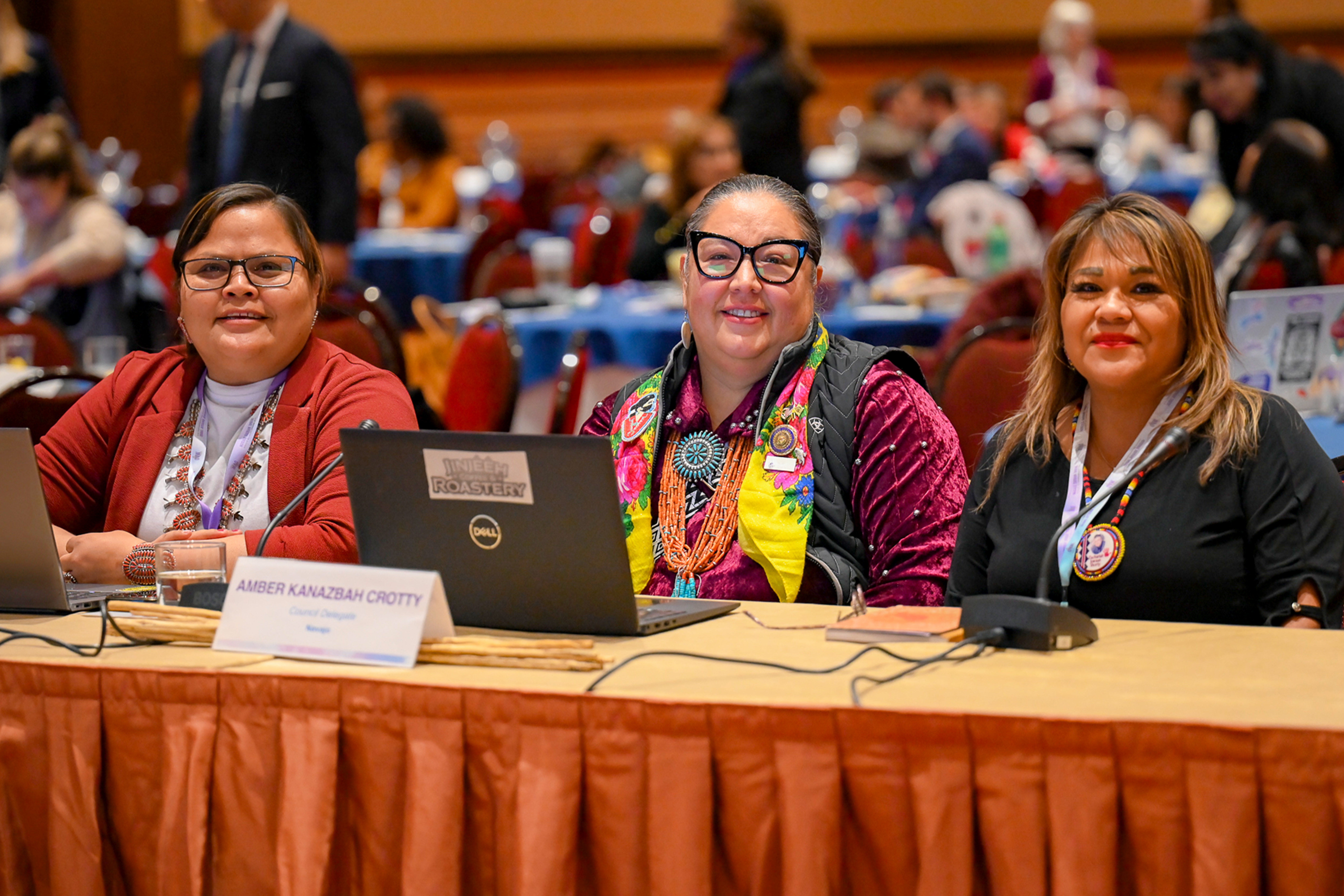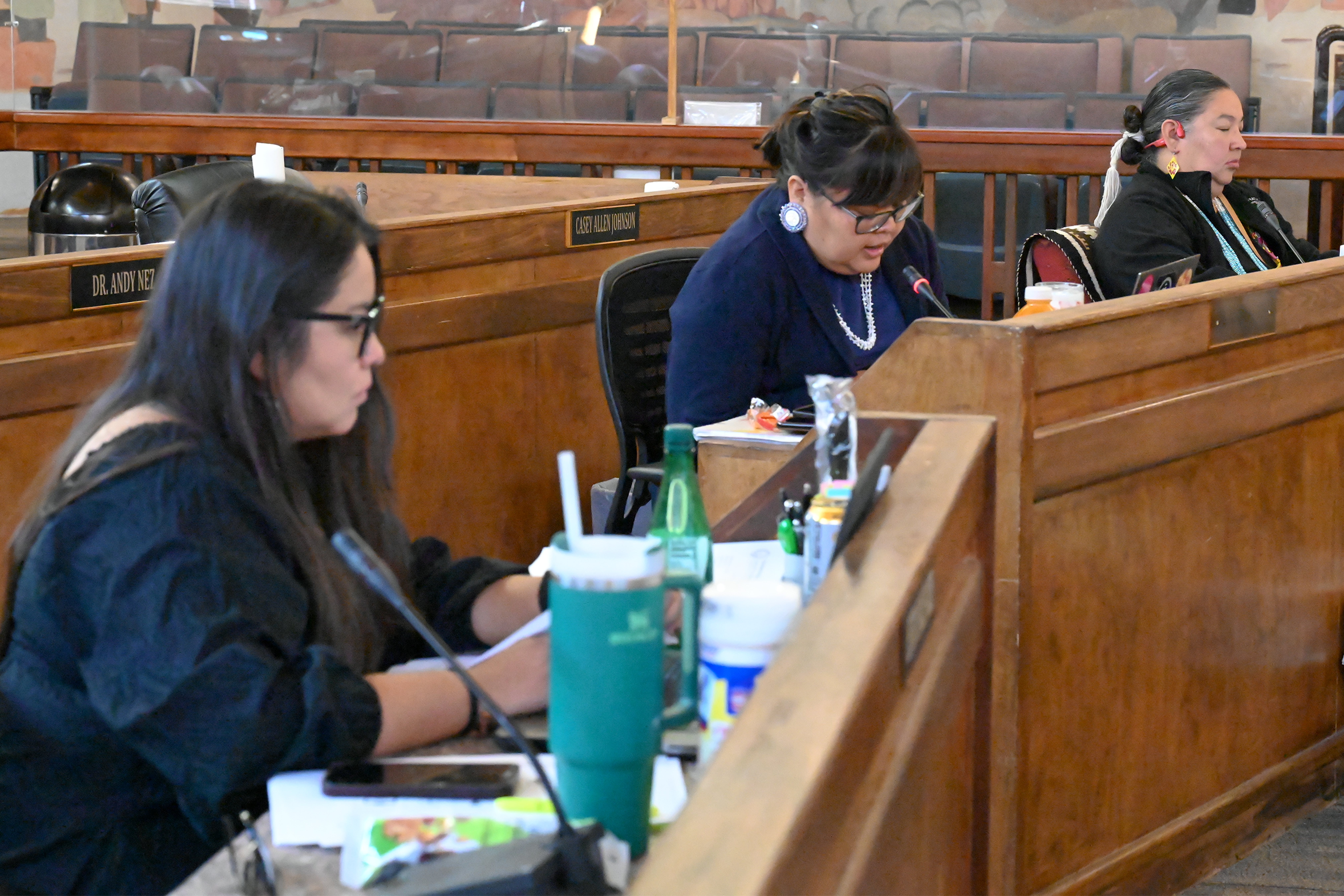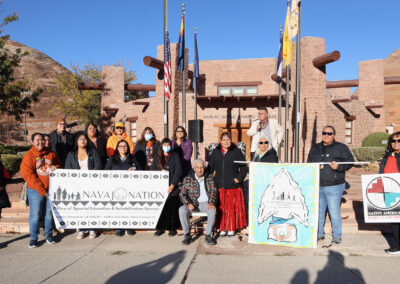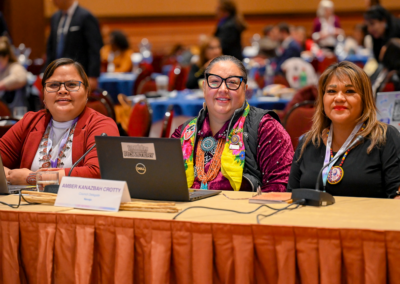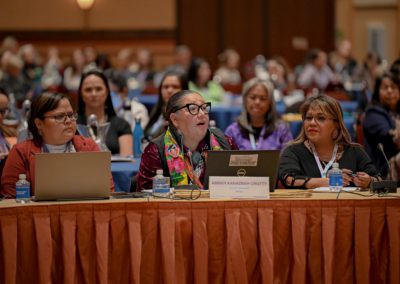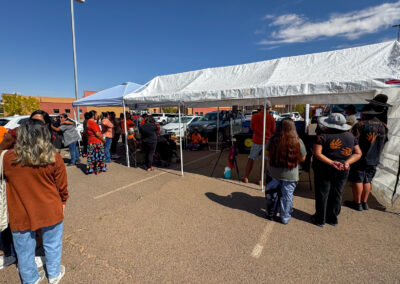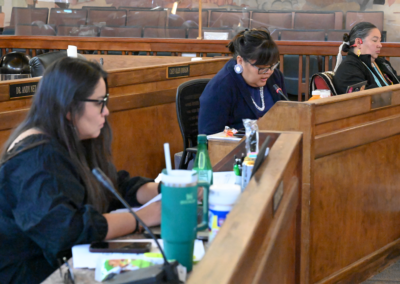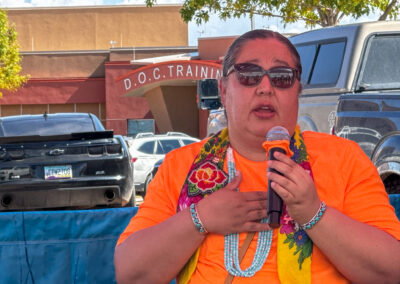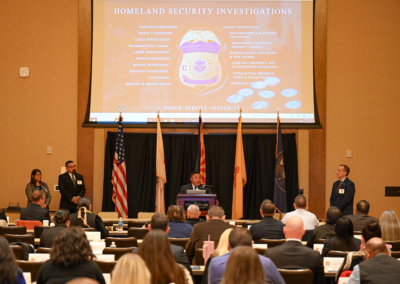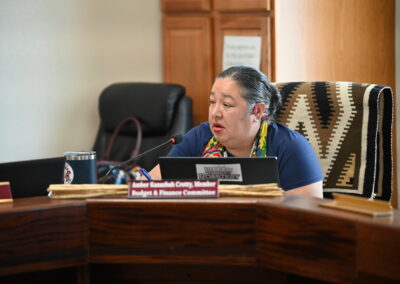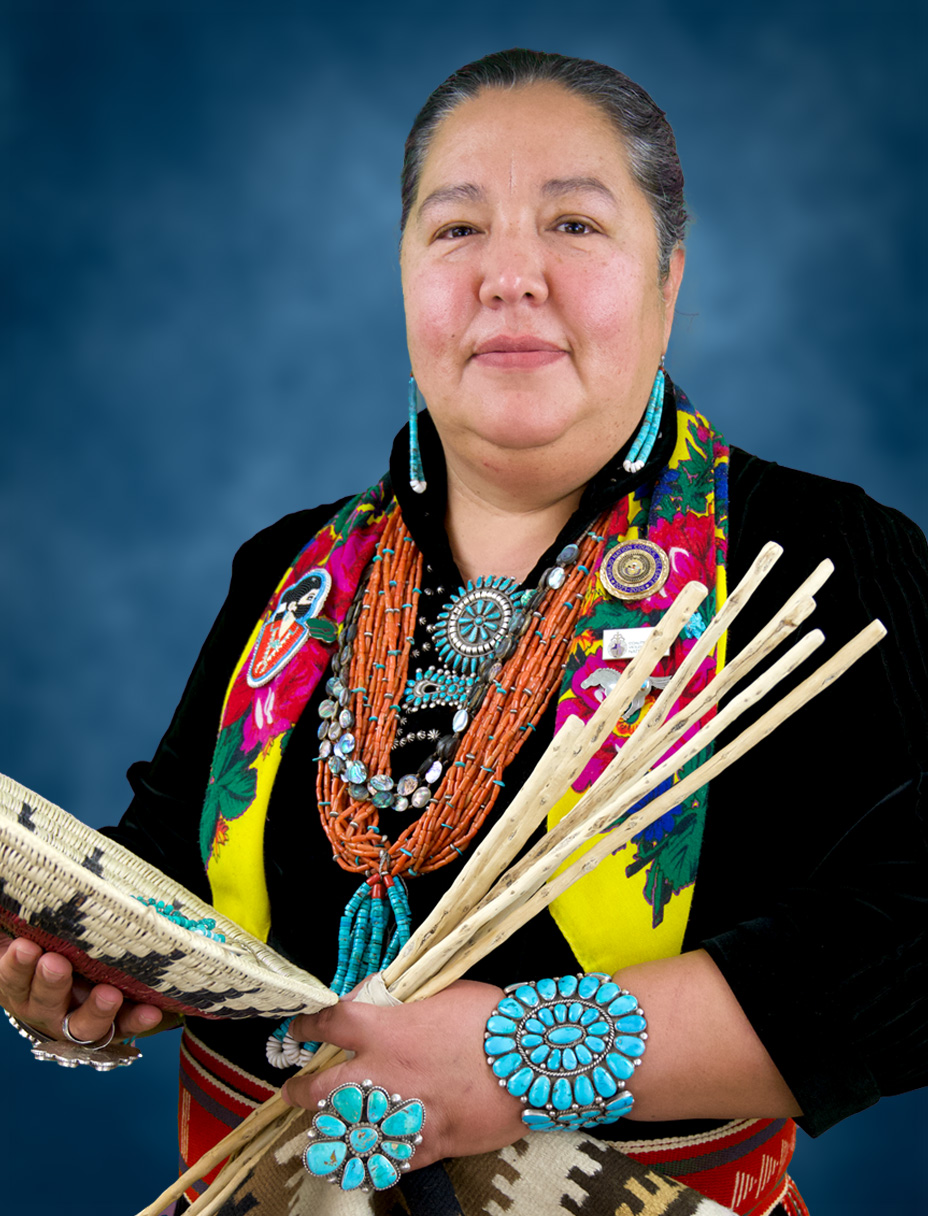
Chair of the Missing and Murder Diné Relative Task Force
Amber Kanazbah Crotty
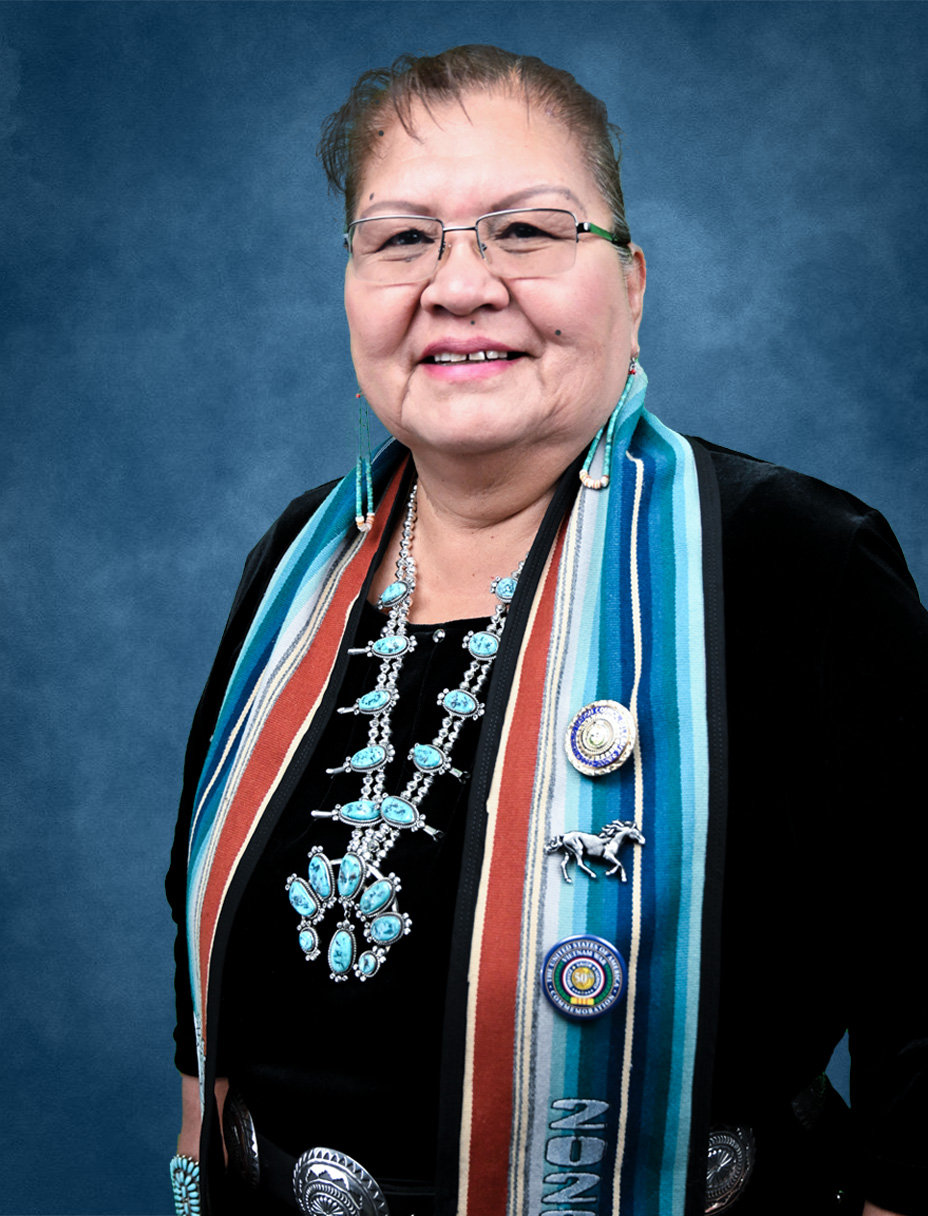
Member of the Missing and Murder Diné Task Force
Helena Nez Begay
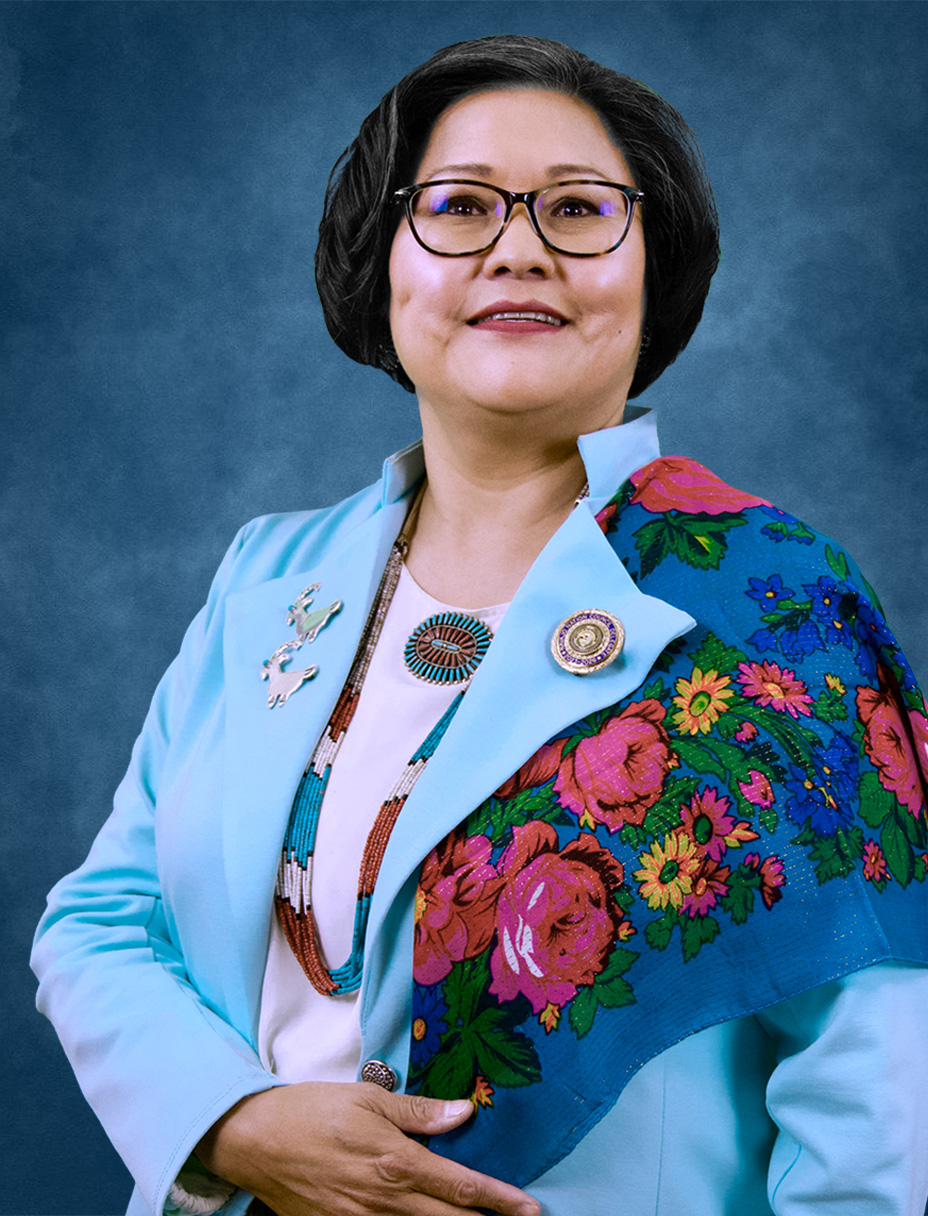
Member of the Resources and Development Committee
Eugenia Charles-Newton
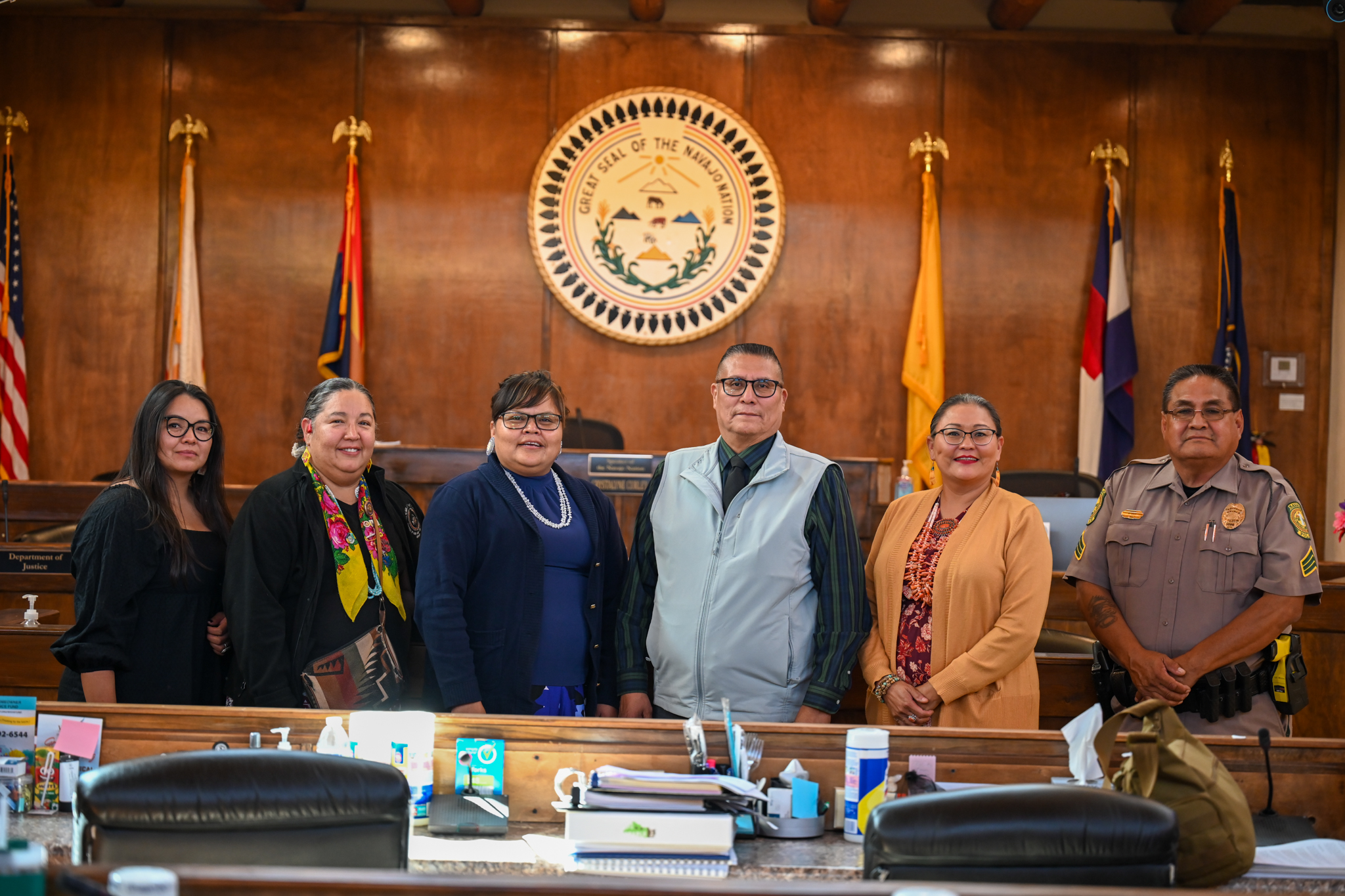
The Missing and Murdered Diné Relatives (MMDR) Task Force was established by the Naabik’íyáti’ Committee to address the alarming crisis of violence, murder, and missing persons affecting Diné people. Focused on advocacy, healing, and justice, the task force employs a holistic approach that includes data-driven initiatives, community engagement, and the development of vital programs like victim services. Through partnerships across tribal, state, and federal levels, the MMDR Task Force seeks to create solutions and pathways for justice and safety, honoring and protecting the Diné community.
Missing and Murder Diné Relative Task Force Livestream
Click here to join the next MMDR Task Force public meeting on Thursdays.
Learn more about the task force and their efforts to bring resources to the community.
Missing Person Toolkit by the Missing and Murder Diné Relatives Coalition
Never feel alone when filling a missing person case, especially for your loved ones, child or friend.
Download the Missing Person Toolkit for resources and guidance when filing a missing person’s case.
Step-by-Step Procedure for Using the Missing Persons Community Action Toolkit
-
Understand the Toolkit’s Purpose
The Missing Person Community Action Toolkit’s purpose is to aid families in locating missing relatives, coordinating with law enforcement, mobilizing search efforts, and improving communication among involved parties. This toolkit is a step-by-step guide to streamline these processes. -
Start with Preliminary Steps
- Gather information about the missing individual (e.g., name, physical description, last known location, etc.).
- Contact local agencies like jails, hospitals, and shelters to check for the individual.
-
Filing a Missing Person Report
- Collect all required documentation, including personal details, recent photos, and information on the last interaction.
- Determine the jurisdiction (tribal, state, or local law enforcement) and file the report accordingly.
-
Create a Missing Persons Poster
- Use the preliminary information and case number from law enforcement to generate posters.
- Post these in relevant locations and circulate them via social media.
-
Mobilize the Community
- Identify roles for volunteers (e.g., coordinators, search facilitators).
- Establish a command post and ensure a systematic and safe search approach.
-
Utilize Logs for Communication and Documentation
- Maintain a Contact Log for individuals and agencies involved in the search.
- Use the Communication Log to record all interactions and updates.
-
Follow Safety and Self-Care Tips
- Ensure team safety during searches with proper planning and communication.
- Manage emotional well-being with self-care practices and support networks.
-
Access Resources
- Refer to the appendix for tools like the jurisdiction map, AMBER Alert guidelines, and tips for media relations.
Importance of the Toolkit
The Missing Persons Community Action Toolkit is vital because it:
- Provides a structured process for families during a distressing time.
- Facilitates collaboration between families, law enforcement, and the community.
- Enhances efficiency and organization in search efforts.
- Offers emotional and practical support for families.
How to Utilize the Toolkit Effectively
- Read the Toolkit Thoroughly: Understand its sections, appendices, and their relevance.
- Organize Information: Use the templates provided for tracking and documenting key details.
- Engage Stakeholders: Work closely with law enforcement, advocates, and volunteers.
- Leverage Social Media: Circulate information to increase visibility and gather leads.
- Adjust Based on Feedback: Update logs and plans as new information emerges.
Tips and Tricks for Using the Toolkit
- Be Honest and Detailed: Provide law enforcement with accurate information, even if it’s uncomfortable.
- Prepare Thoroughly: Use the checklist in Appendix D to gather all necessary data before approaching authorities.
- Delegate Roles: Assign clear roles within your community and family to streamline efforts.
- Maintain Safety: Follow safety tips, especially when conducting searches in remote or hazardous areas.
- Seek Advocacy Support: Use the resources in Appendix A to connect with trained advocates.
- Communicate Clearly: Keep everyone informed using communication logs and command posts.
- Take Care of Yourself: Utilize self-care guidelines to manage the emotional toll of the process.
Resources and Tools for Families of Missing Loved Ones
The 25th Navajo Nation Council’s Missing and Murder Diné Relative Task Force joined forces with other nonprofits, Navajo Nation Executive division and the Navajo Nation Judicial Branch to establishes legislations that protects victims and their families, create new formats how law enforcement handles these types of cases, and advocating for families and communities who are facing these issues.
- Missing and Murder Diné Coalition
- Navajo Missing Person Unit
- Navajo Police Department
- Navajo Criminal Investigation
- Victim Witness Services for Northern Arizona
- Navajo Division for Children and Family Services
- Battered Families Services, Inc.,
- Arizona Domestic Violence Help and Programs
- The New Mexico Coalition Against Domestic Violence (NMCADV)
- Navajo Nation Division of Behavioral and Mental Health Services
The Missing & Murdered Diné Relatives Coalition supports Diné families in locating missing loved ones and seeking justice for those lost, through community support and resource sharing.
The Navajo Nation Missing Persons Unit, within the Navajo Police Department, focuses on addressing cases of missing individuals within the Navajo Nation. This dedicated unit collaborates with federal, state, and tribal authorities to investigate, locate, and bring awareness to missing persons cases. By emphasizing community engagement, providing resources, and offering support to families, the unit works to ensure timely and effective responses to these critical situations.
The Navajo Nation Police Department (NPD) serves as the primary law enforcement agency for the Navajo Nation, covering approximately 27,000 square miles across Arizona, New Mexico, and Utah. Established in 1959, the NPD is dedicated to ensuring the safety and security of the Navajo people through professional services that emphasize protection, prevention, accountability, and innovation.
The Navajo Department of Criminal Investigations, part of the Navajo Division of Public Safety, is tasked with conducting comprehensive investigations into major crimes within Navajo Nation jurisdiction. Their operations span across various district locations, including Window Rock, Shiprock, and Chinle, ensuring extensive coverage and community-focused law enforcement efforts. With specialized units and experienced supervisors, the department upholds public safety and justice through rigorous investigation protocols.
Victim Witness Services for Northern Arizona (VWS) is a dedicated organization committed to providing compassionate support to victims, witnesses, and survivors of crime and trauma. Established in 1984, VWS offers a range of services, including 24/7 crisis response, advocacy, case management, and crisis counseling, all aimed at empowering individuals on their path to healing and recovery. With a mission to be a source of healing, empathy, and support, VWS envisions a just and equitable world where all individuals are safe and free to be their fully realized selves.
The Navajo Division for Children and Family Services (NDCFS) is dedicated to enhancing the well-being of Navajo children, families, and communities. By offering a comprehensive range of services—including child protective services, foster care, adoption support, and family preservation programs—NDCFS aims to ensure safety, stability, and cultural continuity for those they serve. Their mission is to provide quality casework services that address each person’s cultural needs, explain information to the consumer in the language the consumer is most familiar, and provide services in the consumer’s own community.
Battered Families Services, Inc., based in Gallup, NM, empowers women and children affected by domestic violence through comprehensive support services. These include a 24-hour emergency shelter and crisis line, safety planning, transportation, survivor services, and dedicated caseworkers. Specialized programs like the DVOTI help offenders change abusive behaviors, while legal advocates assist victims with Orders of Protection and other essential legal needs.
Arizona offers a comprehensive network of 70 domestic violence programs across 33 cities, providing essential services to individuals in need. These programs offer emergency assistance, legal and financial support, counseling, housing, and community education. Notably, 66% of these organizations have Spanish-speaking staff, ensuring accessibility for diverse populations.
The New Mexico Coalition Against Domestic Violence (NMCADV) is dedicated to leading coordinated and effective responses to domestic violence throughout New Mexico. They offer a comprehensive directory of resources, including shelters, legal assistance, counseling services, and support groups, to assist individuals affected by domestic violence. For immediate assistance, contact the National Domestic Violence Hotline at 1-800-799-SAFE (7233).
The Navajo Nation Division of Behavioral and Mental Health Services (DBMHS) provides comprehensive, culturally-responsive behavioral health services across the Navajo Nation. Specializing in alcohol and substance use prevention, education, treatment, and after-care, DBMHS offers both outpatient and residential programs. Their holistic approach integrates traditional practices and faith-based services to support individuals and families in achieving healing and harmony.
Explore NamUs: The National Resource for Missing and Unidentified Persons Cases
The National Missing and Unidentified Persons System (NamUs) is a comprehensive, federally-funded program dedicated to resolving missing, unidentified, and unclaimed persons cases across the United States. Managed by the National Institute of Justice (NIJ), NamUs serves as a critical resource for law enforcement, forensic professionals, and families searching for their loved ones.
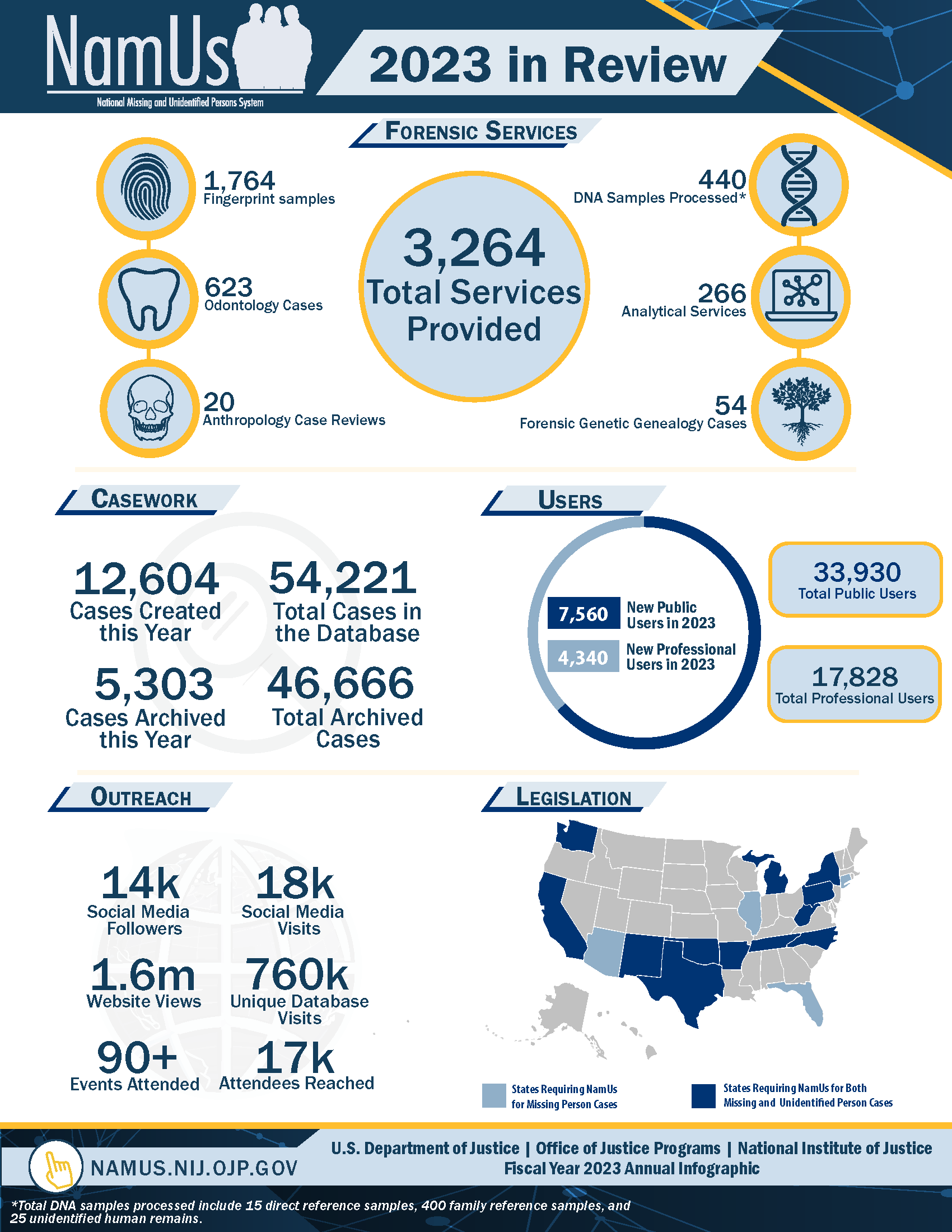
What is NamUs?
NamUs is the nation’s only centralized, secure database for missing and unidentified persons cases. This powerful tool facilitates collaboration among law enforcement, medical examiners, coroners, forensic experts, and the public. By improving access to critical information and leveraging cutting-edge forensic technologies, NamUs bridges gaps in communication and data sharing that often hinder case resolutions.
Since its establishment in 2007, NamUs has assisted in resolving over 46,600 cases, with more than 10,300 identifications achieved through DNA, fingerprints, dental records, and advanced genetic technologies.
Key Features and Services
NamUs offers a range of free resources and services, making it an invaluable asset for investigating and solving cases:
Forensic Services
- DNA analysis, including advanced genetic genealogy.
- Fingerprint examination and forensic anthropology.
- Odontology and tattoo image enhancement.
- Forensic artistry and composite sketches.
Investigative and Analytical Support
- Multidisciplinary case reviews by experts in law enforcement, forensic science, and medicolegal investigation.
- Database crossmatching and geospatial searches to identify connections between cases.
- Support for tribal, juvenile, and sexually motivated homicide cases.
Secure and Unified Database
- Houses over 54,000 cases, enabling detailed searches for missing, unidentified, and unclaimed persons.
- Public users can participate by adding or updating case details to aid investigations.
Training and Outreach
- Free training programs for criminal justice professionals and families.
- Nationwide collaboration with organizations such as the FBI, Department of Homeland Security, and tribal communities.
How to Use the NamUs Website
Navigating the NamUs platform is straightforward:
- Create a Profile: Both public and professional users can register for free.
- Search Cases: Utilize advanced filters to search for missing or unidentified persons by geographic region, physical characteristics, or case status.
- Submit a Case: Law enforcement, medical examiners, and families can upload case details for investigation.
- Access Resources: Explore forensic services, request case reviews, or find training opportunities
The Importance of NamUs
NamUs is more than a database—it’s a vital tool in reuniting families and resolving cases that have long remained unsolved. By offering advanced forensic technology, robust investigative support, and a secure platform for data sharing, NamUs empowers communities to find answers and bring closure.
For more information or to access NamUs services, visit the official website
Office of Medical Examiner (OME)
This section provides essential information about the medical examiners serving Arizona, Utah, New Mexico, and Colorado. Medical examiners play a critical role in helping families of Missing and Murdered Diné Relatives (MMDR) by investigating and identifying remains, determining causes of death, and ensuring that justice can be pursued. Their work combines medical expertise with compassionate care to provide families with answers and closure while supporting broader efforts to address the MMDR crisis. This section is designed to educate and guide families through the processes involved, emphasizing the importance of collaboration between communities and medical professionals.
Arizona Medical Examiners
Understanding the role of medical examiners in Arizona is crucial for public health and safety. These professionals conduct thorough investigations into sudden, unexpected, or unexplained deaths, providing essential insights that aid in legal proceedings and public health decisions. Familiarizing yourself with your local medical examiner’s office can offer clarity during challenging times and ensure you have access to necessary information and support. We encourage you to explore the services and resources provided by medical examiners across Arizona counties, including Maricopa , Coconino , Pima , Yavapai , Mohave , and Pinal .
The Maricopa County Office of the Medical Examiner (OME) conducts thorough investigations into sudden, unexpected, and traumatic deaths within the county. Their mission is to determine the medical cause of death, thereby enhancing public health and safety.
OME offers various services, including assistance with death certificates, case lookups, and reports. For families, a dedicated Family Advocate is ae support and act as a liaison between family members and OME staff.
The Coconino County Health and Human Services Medical Examiner’s Office, located in Flagstaff, Arizona, investigates reportable deaths as defined by Arizona Revised Statute §11-593. Their responsibilities include performing post-mortem examinations to determine the cause and manner of death. Upon request, Arizona law requires a medical examiner to meet with an immediate family member to assist with identification within 48 hours (excluding weekends and holidays) of the family’s notification of the death of a loved one. During that meeting, the family will be provided with an identifying photo or a description to confirm the ID is correct.
The Pima County Office of the Medical Examiner (PCOME) provides accurate, timely, compassionate, and professional death investigation services for the citizens of Pima County, Arizona. The PCOME also serves as the Medical Examiner for Apache, Cochise, Graham, La Paz, and Santa Cruz counties.
Their mission is to determine the cause and manner of deaths that are sudden, unexpected, or unnatural, thereby contributing to public health and safety. The office also offers forensic pathology training and collaborates with various agencies to support the community’s well-being.
The Yavapai County Medical Examiner’s Office serves the citizens of Yavapai County by effectively and efficiently investigating deaths that require medicolegal examination due to non-natural, suspicious, or otherwise unknown circumstances, including patterns of natural death or situations of public health concern.
The Mohave County Medical Examiner’s Office (MCMEO) is dedicated to providing timely and respectful death investigation and postmortem examination services within Mohave County, Arizona. Covering 13,470 square miles, the county is divided into four regions—Kingman, Bullhead City, Lake Havasu City, and the northern area near Colorado City—each served by local Regional Investigators to ensure prompt responses.
The Pinal County Medical Examiner’s Office investigates sudden, violent, unexpected, and suspicious deaths within Pinal County, Arizona. Operating under Arizona Revised Statute 11-593, the office determines the cause and manner of death, conducts postmortem examinations, and provides findings to families and law enforcement agencies as appropriate.
The Navajo County Medical Examiner’s Office is dedicated to the thorough investigation of reportable deaths within the county, aiming to ascertain their cause and manner. Operating under the guidance of Alternate Medical Examiner Dr. Wade Kartchner, the office adheres to the National Association of Medical Examiners’ Forensic Autopsy Performance Standards. Autopsies, when necessary, are conducted through agreements with the Coconino County and Pima County Medical Examiners. The office employs two Medicolegal Death Investigators based in Holbrook and Show Low to support its operations.
New Mexico Medical Examiners
The New Mexico Office of the Medical Investigator (OMI) plays a crucial role in serving the Diné community by investigating unexpected, unexplained, or unattended deaths. Their comprehensive services include medicolegal death investigations, forensic autopsies, and forensic pathology consultations. OMI’s team of experts, such as forensic pathologists and anthropologists, work diligently to determine causes of death, provide expert witness testimony, and offer closure to families by uncovering the truth behind the loss of their loved ones.
The Office of the Medical Investigator (OMI) serves as New Mexico’s centralized, statewide medical examiner system, operating under the University of New Mexico School of Medicine. OMI is responsible for investigating deaths that are sudden, violent, untimely, unexpected, or where the cause is unknown.
Their mission is to improve health, safety, and justice in New Mexico through professional death investigation and certification.
Utah Medical Examiners
The Utah Office of the Medical Examiner plays a crucial role in investigating deaths to provide answers for families of Missing and Murdered Diné Relatives. As a key resource, the office ensures thorough medical and forensic examinations to determine causes of death, aiding justice and closure for affected families.
Colorado Medical Examiners
The Denver Office of the Medical Examiner (OME) serves a vital role in investigating deaths within the city and county of Denver, Colorado. Their responsibilities include determining the cause and manner of deaths, particularly in cases involving violence, unexpected occurrences, or individuals without medical care. For the Navajo community, the OME’s work is crucial in providing answers and support to families of missing or murdered Diné relatives, ensuring thorough investigations and compassionate communication during challenging times.
National Center for Missing & Exploited Children (NCMEC): A Vital Resource for Child Protection
The National Center for Missing & Exploited Children (NCMEC) is a leading nonprofit organization dedicated to safeguarding children from abduction, abuse, and exploitation. Established in 1984, NCMEC serves as a comprehensive resource for families, law enforcement, and child welfare professionals across the United States.
-
Recovery: Assisted with 28,886 reports of missing children, contributing to the recovery of numerous young lives.
-
Protection: Processed 36.2 million reports of suspected child sexual exploitation through the CyberTipline, highlighting the pervasive nature of online threats.
-
Prevention: Provided 42,761 training instances to child-serving professionals, enhancing their ability to prevent and respond to cases of missing or exploited children.
-
CyberTipline: A centralized reporting system for cases of child sexual exploitation, enabling swift action and collaboration with law enforcement agencies.
-
NetSmartz: An educational initiative offering free, multimedia internet safety presentations tailored for specific audiences, including parents, teens, and younger children, to promote safe online behaviors.
-
Recovery Services: Specialized support for families and law enforcement in locating and recovering missing children, including those who are victims of child sex trafficking.
NCMEC works closely with government agencies, law enforcement, and other organizations to create a safer environment for children. Through partnerships and public awareness campaigns, NCMEC amplifies its reach and effectiveness in protecting children nationwide.
Public support is crucial to NCMEC’s mission. Donations, volunteer efforts, and participation in educational programs contribute significantly to the organization’s ability to respond to and prevent child victimization. Every contribution helps ensure that every child has a safe childhood.
National Center for Missing & Exploited Children: Protecting Kids, Restoring Hope
Join the mission to safeguard children and support families in need. The National Center for Missing & Exploited Children (NCMEC) is a vital resource for preventing child abduction, combatting exploitation, and reuniting families. Explore the tools, programs, and success stories that are making a difference in communities across the nation.
Visit NCMEC’s Impact Page to learn more about their transformative work and how you can contribute to creating a safer future for all children. Stay informed, share resources, and be part of the solution today!
Learn more about the 25th Navajo Nation Council’s Missing and Murder Diné Relative Task Force!
Read the latest press release for the Missing and Murder Diné Relatives Task Force
Follow the 25th Navajo Nation Council
Follow us on Instagram!
FOR IMMEDIATE RELEASE October 21, 2024 Navajo Nation Council unites to advocate for Domestic Violence and Disability...
Posted by 25th Navajo Nation Council on Monday, October 21, 2024

